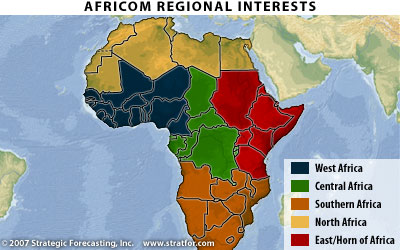Peacekeepers depend on the Pentagon, in South Sudan, CAR, DRC, Uganda, Rwanda

Turning now to news of Africa, the Central African Republic, Democratic Republic of the Congo and South Sudan all share borders. Each of these three countries is now engulfed in tribal or religious sectarian violence, and Uganda, a longtime U.S. military partner, has troops in both the Central African Republic and South Sudan.
U.S. Special Forces have been on the ground with Ugandan troops in both countries since 2011, reportedly to hunt for Joseph Kony. KPFA’s Ann Garrison reports on the U.S. rationale for these troop deployments.
Pundits and policymakers daily invoke “the lessons of Rwanda,” meaning the world’s failure to prevent the 1994 Rwandan Genocide, as cause for military intervention by the U.S. and other Western nations and by U.N. peacekeeping troops. In Africa, all these interventions rely on U.S. military infrastructure, including bases, air strips, vehicles, planes and state-of-the-art surveillance tech.

This week U.S. Air Force C-17 cargo carriers began to fly 850 Rwandan peacekeeping troops to the Central African Republic, where U.S. Special Forces have been deployed with Ugandan troops since 2011. Ugandan troops also crossed the border to fight alongside South Sudanese government troops in that country’s civil war.
There is as yet no information as to whether Ugandan troops in South Sudan are accompanied by U.S Special Forces, though more Special Forces were flown to Uganda, reportedly to help evacuate American citizens.
Today, negotiators of the South Sudan conflict announced a tentative ceasefire agreement, which has not yet been signed, but calls for the withdrawal of all foreign troops. The U.S. State Department has criticized both sides’ resistance to ceasefire terms but has agreed with the faction fighting President Salva Kiir that the war was not triggered by a coup attempt in mid-December, because there was no coup attempt.
During last week’s Senate Foreign Relations hearing on South Sudan, senators expressed outrage about the region’s ethnic and sectarian violence, in accordance with the U.S. vow to stop genocide and mass atrocities around the world.
However, Mahdi Nazemroaya, researcher, foreign correspondent and author of “The Globalization of NATO,” says that U.S. intervention has in fact promoted ethnic division, sectarian war, and partition or secession into independent, ethno nationalist states, like South Sudan.
Mahdi Nazemroaya: Yeah, there’s a long history behind this process. There is obviously vilification of the central government in Sudan. George Clooney is nowhere to be found now.
When there was talk about a possible genocide in South Sudan, that’s when the media stopped talking about the fighting there – when independence happened. It’s very ironic. When the fighting became serious in South Sudan, between the militias of the people that formed the government fighting each other for power and basically the spoils of war, the media stopped reporting about it.
That’s when they stopped talking about what’s happening in South Sudan, and they stopped focusing on this country. But before it, they kept on talking about how genocide and ethnic cleansing was taking place. How there was humanitarian crisis. They were talking about racial politics. And they were doing everything to feed ethno-nationalism. And this has been fed for many decades. It starts with the British.
KPFA: Nazemroaya also said that the neo-liberal privatization agenda is then imposed upon the targeted nations where the U.S. has exacerbated ethnic tension. He said that the same thing had happened in every country where the U.S. had intervened militarily since 2001, including Iraq, Afghanistan, Libya and Somalia – and now, South Sudan.
Mahdi Nazemroaya: When the United States does move into these countries with its allies, one of the first things they do is – this neo-liberal paradigm is imposed on these countries, and their constitutions are changed, where private enterprise – corporate private enterprise – is allowed to come in, national assets are sold off and these countries are essentially turned into economic colonies.
KPFA: The 2009 South Sudan Land Act was passed during the country’s transition to independence from Sudan. McGill University Professor Khalil Medani, speaking on KPFA’s Voices of the Middle East, said that this legislation opened large tracts of land that had been communally owned, with grazing and other rights worked out between tribes over time, to private and foreign ownership. This privatization of communal land, he said, had further heightened ethnic tension by forcing the country’s tribal peoples to compete for fewer resources.
In Berkeley, for Pacifica, KPFA and AfrobeatRadio, I’m Ann Garrison.
Oakland writer Ann Garrison writes for the San Francisco Bay View, Counterpunch, Global Research, Colored Opinions, Black Star News and her own website, Ann Garrison, and produces for AfrobeatRadio on WBAI-NYC, KPFA Evening News and her own YouTube Channel, AnnieGetYourGang. She can be reached at [email protected]. This story first appeared on her website. If you want to see Ann Garrison’s independent reporting continue, please contribute on her website at anngarrison.com.


